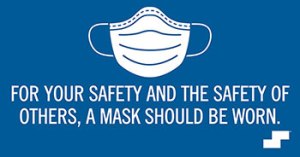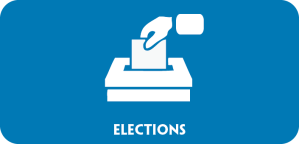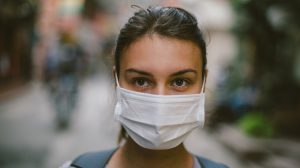
St. Joseph Medical Center photo
By Casey Bukro
Ethics AdviceLine for Journalists
“Oh, what a tangled web we weave…when first we practice to deceive.” – Walter Scott.
The debate or confusion over wearing a mask as a defense against coronavirus-19 is a tangle of mixed messages that began with deception.
It’s a good lesson in why honesty is the best policy, a concept government officials often don’t understand.
On March 2, U.S. Surgeon General Dr. Jerome Adams told people to stop buying face masks to prevent the novel coronavirus, warning that they actually might increase risk of infection if not worn properly, wrote Jacqueline Howard of CNN.
“You can increase your risk of getting it by wearing a mask if you are not a health care provider,” Adams said during an interview on Fox & Friends. “Folks who don’t know how to wear them properly tend to touch their faces a lot and actually can increase the spread of coronavirus.”
The virus was spreading in communities, he acknowledged, but “there are things they shouldn’t be doing and one of the things they shouldn’t be doing in the general public is going out and buying masks.”
To emphasize, Adams tweeted: “Seriously people – STOP BUYING MASKS! They are NOT effective in preventing general public from catching #Coronavirus, but if health care providers can’t get them to care for sick patients, it puts them and our communities at risk!”
A reason for deception
There was the reason for the deception, which became more evident as weeks passed. Public officials worried that health care providers would not be able to get them if the public rushed out to buy them. And, for sure, the United States proved to be ill-equipped and unprepared for the coronavirus onslaught. At first, health care workers did voice concerns about supplies of personal protective equipment.
Hundreds of health care in Michigan were working without such equipment as covid cases exploded across the state, the Detroit News reported.
Let’s pause here for a moment to ask: Rather than telling the public the use of face masks was ineffective or even dangerous, why not tell the truth and say health care workers should be the first to get this valuable equipment? Why not ask for public cooperation? Public officials also are prone to withhold the truth when they say the public might panic if they knew the truth. It would make a lot more sense to explain the dangers and give the public time to prepare for an emergency. Public officials too often treat the public as though they are ignorant, unable to make decisions about their own welfare. So they lie, as though that is in the public interest. Public officials like to think they are smarter than everyone else, contrary to plenty of evidence.
But back to the coronavirus.
On March 30, the World Health Organization held a media briefing. WHO officials did not recommend mask wearing by healthy members of the general population. Masks, they said, should be worn by those with the disease or those in contact with them. Still, months after the pandemic began to spread, people remained unsure about whether a mask was needed to keep them safe. Meanwhile, South Korea and Japan distributed them to the public while the Czech Republic and Slovakia made wearing them mandatory.
Updated guidance
On April 3, the Centers for Disease Control and Prevention updated its guidance about wearing face coverings during the pandemic. It advised Americans to wear non-medical cloth face coverings, including homemade coverings fashioned from household material. They should be worn in public settings, said CDC, like grocery stores and pharmacies, wrote Mandy Oaklander.
CDC recommended surgical quality masks only for people who already showed symptoms of coronavirus and must go outside, since wearing a mask can help prevent spreading the virus by protecting others nearby when you cough or sneeze. CDC did not recommend N95 face coverings, the tight-fitting masks designed to filter out 95% of particles from the air that you breathe – except for health care workers.
But people bought and used them, which says something about public wisdom.
Also on April 3, Donald Trump, president of the United States, said he would opt out of wearing a mask, calling public health recommendations voluntary.
“I don’t think I’m going to be doing it,” he said, suggesting that it would be awkward to do such a thing in the Oval Office. “Wearing a face mask as I greet presidents, prime ministers, dictators, kings, queens — I just don’t see it.”
After weeks of insisting Americans should not wear masks to prevent the disease, administration officials debated over reversing course. They were divided about the wisdom of advising Americans to cover their faces in public, fearing it would be a setback to the social distancing policy favored by officials. They recommended Americans wear non-medical cloth face coverings.
Another turnabout
“At stake was another turnabout for a White House that has sown confusion with its response to the coronavirus pandemic sweeping the nation,” writes Kevin Liptak of CNN. “The debate over masks has come to encapsulate a federal effort marked by repeated reversals, conflicting recommendations, low stockpiles and competing internal interests that often lead to muddled messaging.”
Speaking at a White House briefing, U.S. Surgeon General Adams admitted: “It has been confusing to the American people.” The change, he said, resulted from new information showing that people without covid symptoms were spreading the infection.
New guidelines, said Adams, advised Americans to wear cloth face masks in public settings where social distancing guidelines are difficult to maintain, such as grocery stores.
The argument that a public rush to buy face masks would jeopardize health care workers began crumbling, in the U.S. and in Great Britain.
The Guardian reported on April 23 that the claim by British ministers that public use of masks could jeopardize the National Health Service supplies “is disingenuous.”
“The face masks recommended for use in the community by various bodies are homemade cloth masks or reusable washable masks of the type used by cyclists,” reported The Guardian. “A recommendation for that type of mask is not likely to impact on the supply of the rather different single-use medical masks.”
Masks used in China
This should not have been too difficult to figure out in the United States or anywhere else, since masks were used widely in China against dense air pollution in metropolitan areas, like Shanghai and Beijing. Americans quickly resorted to tying bandanas across their faces, a tactic used by cowboys riding dusty trails. Odd something that simple did not occur to government officials struggling with who should wear face masks.
By June 25, the story shifted. “How Do You Deal With People Who Refuse to Wear a Mask?” wrote Barbara Krasnoff in “The Verge.”
“You’d think that months of reading about overflowing hospitals and mounting death statistics would scare almost anyone into following the current Centers for Disease Control recommendations: wear a mask in public spaces to protect others from possible infection, especially since there is no current way to be sure who may be an asymptomatic transmitter – particularly in relatively crowded urban areas,” Krasnoff wrote.
“However, these days, when I go out for a walk or to run errands, at least half the people I see are not wearing masks – or are wearing their masks around their necks, as though those pieces of cloth or paper are good-luck totems rather than items with a specific purpose.”
Only in America
By then, something strange had happened, something that might come under the heading of “only in America.” Refusing to wear a face mask became a political statement. People were following the example of President Trump. Eventually Trump did wear a mask, joking that it made him look like the Lone Ranger, a fictional character who fought outlaws in the Old West.
On June 30, Yahoo Life reported “a worrisome trend of public leaders speaking out against the use of protective face coverings, something that experts say is vital in slowing the spread of coronavirus.” Though Arizona broke a record with the highest single-day increase of covid cases only days earlier, a Scottsdale councilman removed his face mask, complaining “I can’t breathe,” during an anti-mask rally.
This clash between politics and medical science only deepened public confusion and anxiety over mixed messages from the Trump administration.
“What bothers the health care workers is mixed messaging from our leaders,” Dr. Luis Rosario, a critical care specialist, told Yahoo Life. “Why do you have to politicize a mask? I will never understand that.”
It is one of the oddities of the coronavirus assault. The refusal to wear masks is blamed for some pandemic deaths. Dr. Rosario said, “many of these people really didn’t need to die.”
By July 2, BBC News online reported that face coverings on public transport was mandatory in England and Scotland, and soon would be mandatory in shops in Scotland. This was in line with updated World Health Organization advice, which said non-medical face coverings should be worn in public where social distancing is not possible. In England, they should also be worn by hospital staff, outpatients and visitors.
Case counts climb again
By July 13, Bloomberg reported that many places that suffered most in the first wave of infections, including California, Louisiana, Michigan and Washington state, were seeing case counts climb again after months of declines.
Experts say the resurgence in the original covid battlegrounds had similar causes, according to Bloomberg. They include a population no longer willing to stay isolated indoors, Republicans who refuse face masks as a political statement, protests over police violence and young people convinced the virus won’t seriously hurt them.
This resistance to wearing masks is not new, wrote J. Alexander Navarro, assistant director of the Center for the History of Medicine, University of Michigan. It all happened before during the 1918 Spanish Flu pandemic. Health authorities campaigned for ordinances mandating face masks. Some proposed sentencing scofflaws to short jail terms and fines ranging from $5 to $200. Those refusing to wear masks were called “slackers.”
Debates over such regulations were just as vociferous then as they are now. A draft resolution in Portland, Oregon, led to a heated city council exchange, with one official declaring the measure “autocratic and unconstitutional,” adding that “under no circumstances will I be muzzled like a hydrophobic dog.” It was voted down.
“Deeply entrenched ideals of individual freedom, the lack of cohesive messaging and leadership on mask wearing and pervasive misinformation have proven to be major hindrances thus far, precisely when the crisis demands consensus and widespread compliance,” writes Navarro. “This was certainly the case in many communities during the fall of 1918. That pandemic ultimately killed about 675,000 people in the U.S. Hopefully, history is not in the process of repeating itself today.”
It’s chilling, though, to see how much history is repeating itself.
“Those who cannot remember the past are condemned to repeat it.” Philosopher George Santayana.
*********************************************
The Ethics AdviceLine for Journalists was founded in 2001 by the Chicago Headline Club (Chicago professional chapter of the Society of Professional Journalists) and Loyola University Chicago Center for Ethics and Social Justice. It partnered with the Medill School of Journalism at Northwestern University in 2013. It is a free service.
Professional journalists are invited to contact the Ethics AdviceLine for Journalists for guidance on ethics. Call 866-DILEMMA or ethicsadvicelineforjournalists.org.









